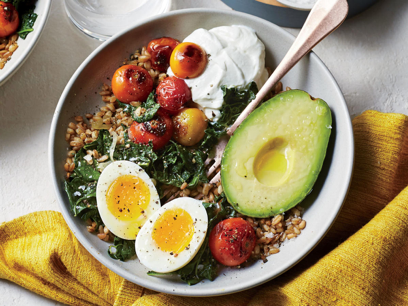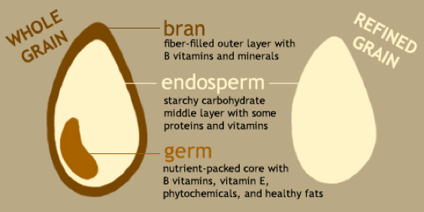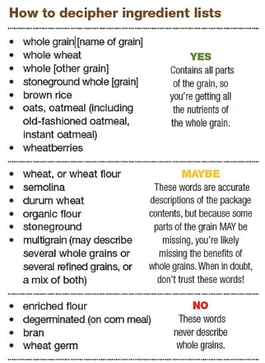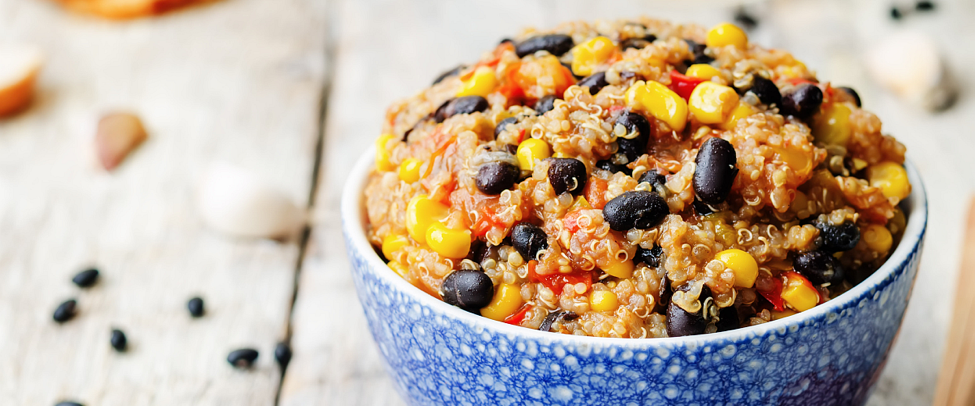
Do I have to ditch carbs to stay healthy?
SHORT ANSWER: NO. There are actually a variety of benefits to including whole grains into your diet, the important thing to watch out for is the refined grains. A fellow Aramark Dietitian says it best, “Reducing the amount of refined grains you eat from foods like regular white bread, plain rolls and other baked goods is something most of us should do for better health."
The USDA’s Dietary Guidelines for Americans actually recommends eating grains daily, and making at least half of them whole grains.
The variety of benefits offered from whole grains include fiber (to help you stay full) , plant-based protein (to provide energy) , and other vitamins and minerals your body needs to stay healthy, reduce the risk of several chronic diseases, and help you feel better and have more energy.
What differentiates a whole grain versus a refined grain?
All grains start off whole. However, when they’re milled into their refined form the nutritious bran (the outer layer with its fiber, B-vitamins and minerals) and the
 germ (the nutrient-packed heart or core of the grain) are stripped away, leaving only the starchy middle layer. Once these parts are taken away, the refined grain is missing almost all of the original fiber, a large portion of the naturally occurring beneficial nutrients, and a significant amount of the protein. While many manufacturers try to compensate by adding back some lost nutrients through vitamin enrichment, unfortunately, with so much of the good stuff removed, refined grains are less healthy for you.
germ (the nutrient-packed heart or core of the grain) are stripped away, leaving only the starchy middle layer. Once these parts are taken away, the refined grain is missing almost all of the original fiber, a large portion of the naturally occurring beneficial nutrients, and a significant amount of the protein. While many manufacturers try to compensate by adding back some lost nutrients through vitamin enrichment, unfortunately, with so much of the good stuff removed, refined grains are less healthy for you.
Whole grains on the other hand include every nutritious part of the grain. And this is true for all grains, not just wheat. Everything from wheat, corn, rice, oats, barley, quinoa, farro, sorghum, spelt, and rye start as whole grains and that’s the best way to eat them.
Why does eating a whole grain make such a big difference in the way you feel?

When you eat whole grains, they are digested more slowly. The fiber in the whole grain literally slows down the digestion process. This means that you feel satisfied longer, in part because it helps avoid the kind of blood sugar spikes you can get when eating refined grains, which are digested more quickly.When you eat whole grains, they are digested more slowly. The fiber in the whole grain literally slows down the digestion process. This means that you feel satisfied longer, in part because it helps avoid the kind of
Ingredient lists are going to be very important to review when determining whole grains vs. refined grains. The chart to the right will help you decipher what to look for.
So in conclusion, for a variety of reasons, replacing refined grains with whole and minimally processed grains in your diet is a healthy step in the right direction. And good news, you do not have to cut carbs out of your diet to stay healthy, you just need to make sure you’re choosing the right ones!

Recipe of the Month: Corn and Quinoa Salad
Protein-rich quinoa is tossed with corn, cabbage, peppers, and scallions then drizzled with a kicky ancho-lime dressing. Serve this recipe as a side dish, or add it to your favorite lettuce greens or spring mix for an entree.
Ingredients:
- 2Tbsp lime juice fresh
- 2Tbsp olive oil
- 1/2tsp dried ancho pepper ground
- 1/4tsp kosher salt
- 1/8tsp onion powder
- 1clove garlic peeled and minced
- 3 1/4cups quinoa cooked
- 1 1/2cups tomato cored and diced
- 1 1/4cups cabbage shredded
- 1 1/4cups black beans cooked or canned (rinsed and drained)
- 1/4cup green pepper seeded and diced
- 1/4cup corn thawed if purchased frozen
- 1Tbsp green onion trimmed and thinly sliced, scallion
- 1Tbsp cilantro chopped
- 1-2 corn tortillas 6” diameter
Instructions:
- In large bowl, whisk together lime juice, oil, ancho pepper, salt, onion powder, and garlic.
- Add to bowl remaining ingredients except tortillas; toss well. Cover and chill.
- Cut corn tortillas in half, then cut each half crosswise into strips (“straws.”) Bake straws on parchment-lined sheet pan in preheated 400oF oven 2 minutes, or until golden. Cool.
- Portion corn quinoa salad to serve; top with a few tortilla straws for extra crunch.
For more healthy eating tips, contact the Thorek Memorial Hospital Food & Nutrition Department.